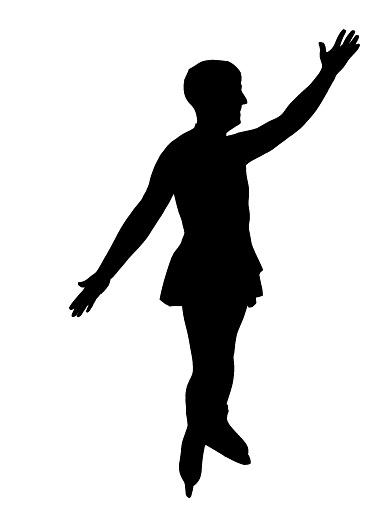HE SAID, EXCUSE ME MAAM, MAY I WEAR A DRESS?
By David Kettlewell
You may have read about Steven, he’s the male skater who wears a dress on the ice.
If you haven’t heard of him, read the center insert. It gives the details.
As an author with 24 years of professional writing experience, I’ve never dealt with an issue that generated such tremendous emotion from the public.
Respected, intelligent, successful people literally accosted me with views that were anything but balanced or reflective of a considered viewpoint.
I was told his genetic material should be removed from the gene pool, that he was ungodly, and worse. Friends from the skating world called to suggest the story should not be written.
What follows is my attempt to make sense of the emotions. It is theatrical. It is overblown, by design.
The essentials of the story are pretty obvious, and even predictable for those of us born and raised in Ohio.
A man chooses to wear a dress on the ice. People make fun of him. He feels outcast. End of story. Or is it?
We Midwesterners have about as much tolerance for this type of behavior as we do for a fish that won’t swim.
Ok, let’s put it another way. You want to win the Presidency? You better win Ohio because as goes Ohio, so goes the nation.
I figure it has to do with the frontier of the 1800’s. The real conservative types stayed in the East, and the real adventurous went to California, but the middle of the roaders…yep, we’re here in Ohio.
So the predominance of opinion is against the guy wearing a dress. He’s never hurt anyone, that’s not the point. You don’t have to hurt anyone. Just don’t “go along.”
Clearly, he’s not “going along.” Step in line boy, you should.
Like the prison guard with the shotgun in Cool Hand Luke who bloats, “What We Have Here Is A Failure to Communicate.” Luke ended up shot and driving at a snail’s pace in the ambulance till he died. Or Jack Nicholas’s character in One Flew Over The Cuckoo’s Nest. He didn’t want to take his pills, he didn’t want to get along so he got lobotomized and had the life literally smothered out of him with a pillow.
Think this is just in the movies? Think again.
Guess what, what we say about the man in the dress says whole lots more about us than it does about him.
WE say he doesn’t fit in, he won’t go along, he’s sick, and maybe dangerous.
What we should say is we expect everyone to fit in, that you better go along to get along, that we define those that don’t as sick, and that it’s we who can be dangerous.
One finger points, three point back.
In the 1700’s men of the aristocracy wore wigs, perfume, makeup, stockings, and little bitty outfits that look a lot like a skirts.
What we wear is merely a convention, we agree to agree, about clothes at least.
Wear this, it says you fit in. True in bowling leagues and the corporate suites.
So what does it say when a person chooses to wear something different?
Well, I don’t think we like what it says.
It says that our conventions aren’t the final word. That our views aren’t the only ones that count. That he can choose to be different. And that if we don’t like it, we can go jump.
Not that we don’t like a bit of the outcast in our stars. Madonna, Marlon Brando, Avril Lavigne, bad boys all. But please, pretty please, not too outcast.
Look, you can wear a Harley outfit and ride a Fat Boy, that’s ok, but don’t wear a dress.
We wear the thick muck of prejudice around our necks like an oxen yoke, and it fits so good we don’t even see it.
For most, our eyes are the key to our prejudices. Forget about them being the window to the soul. It’s prejudice we like, pure prejudice. See a black man, hate a black man, see a white man, hate a white man, you get the point.
To see beyond the eyes, to view something and think clearly about what our options are, how we choose to respond from various options, this is a monumental task, Herculean. It’s like, “Love Your Enemy,” Jack, that’s hard.
Convention can be a good thing. It makes traffic flow work. But convention has an ugly side too.
Like when we can’t even tolerate a dress. Or an accent in speech.
We’re a lot closer to our nation’s potential regarding armaments than we are with the nuances of freedom.
Better than thou? Don’t count on it. Do I like a man in a dress? No. I’m an Ohioan.
What does it mean when we react so to a guy in a dress? Who does it hurt? Why do we care?
You tell me.
